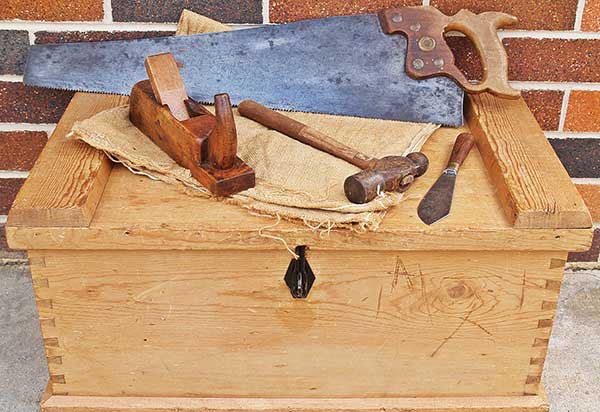Carpenter Work
“By a carpenter mankind was made and only by a carpenter can mankind be remade” —Desiderius Erasmus

Reflections by Joel Mumma
Four years ago, the relentless stresses of teaching finally caught up with me and forced me into early retirement after thirty years in the classroom. Since then, I’ve had more time alone with my thoughts than perhaps ever before in my life. It has been, I must say, a most unsavory experience.
Just like Paul, I find a war within me: “For what I will to do, that I do not practice; but what I hate, that I do.” (Romans 7:15, 19) And even worse, my will itself is hell-bent upon its own sinful purposes so that frequently I don’t even want to do the right thing, and things I know I should hate instead I secretly love. Like Paul, I cry out “O wretched man that I am! Who will deliver me from this body of death? I thank God – through Jesus Christ our Lord!” (Romans 7:25) I know from experience that, apart from His grace working through me, sin is my default setting: not theoretically, but perpetually.
This is the point at which I recoil from the very thought of mankind having free will. Erasmus reminds us in the quotation above that God Himself came to us, stooping far lower than a carpentry shop and lower even than a feed box in a stable. He became, as Michael Card sings, a “holy embryo.”

Carpenter tools representative of Christ’s work in us.
But why would the Most High come so unimaginably low if we, pulling ourselves up by our own Arminian bootstraps, could just as easily have met Him somewhere in the middle on His way down? That’s because we were “dead in trespasses and sins” (Ephesians 2:1): not sick, not even gravely ill, and certainly not on the mend, but dead as a doornail, like Jacob Marley, and as unlovely and unlovable as you’d expect a corpse to be.
Yet, even knowing that God has come in the person of Jesus, I waiver and feel torn like Peter: “Depart from me, for I am a sinful man, O Lord!” (Luke 5:8); but then “Lord, to whom shall we go? You have the words of eternal life.” (John 6:68)
I marvel most that He wants me! Another reformer Martin Chemnitz writes, “For Christ, both God and man, must lay hold on us in order that there may be a union between him and us.” This leaves me dumbstruck! Not only must the Lord seek me, because I couldn’t seek Him and didn’t really want to anyway, but also, now that He’s got His hands on me, He has absolutely no intention of ever letting go.
Retirement lets me reinvent myself: tutor, tour guide, gardener, Grandpa. But the Lord’s plans for me are what fire my brightest hopes. Ellie Holcomb sings “He takes broken things and makes them beautiful.” Carpenters are talented that way.
by Joel Mumma, retired public schoolteacher, Lancaster, PA
(Join us each Thursday for a fresh look at a quote from the Reformation era. Sign up via our e-newsletter (in the box at the right) or through our RSS feed (above), or follow us on Facebook for the next year as we celebrate 500 years of Reformation.)
The latest Christian History magazine was the third in our series on the Reformation. Read it for free here, order it here, and subscribe to get future issues in print here!



